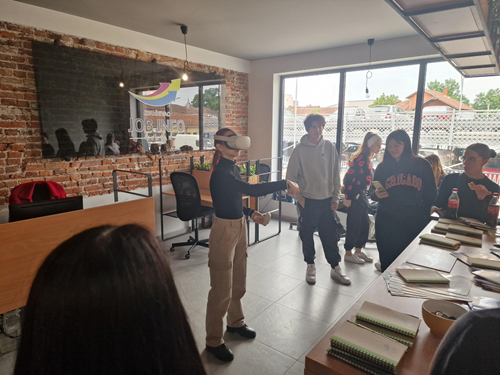News
Breaking barriers: Swiss-Serbian partnership unleashes virtual reality to attract Serbian youth to job training opportunities

News
Showcasing the effectiveness of work-based learning at a regional event, the ‘Education to Employment (E2E)’ project presents its newly developed career guidance and counselling VR tool to unlock a brighter future for young job seekers in Serbia
In Belgrade today, stakeholders from around the Western Balkan region and further afield are gathering to hear about the best examples of learning through work and social inclusion. Implemented by NIRAS, the Swiss-supported E2E project is organising the conference with the goal of sharing best practice in formal and non-formal vocational and educational training, including work-based learning, in the Western Balkans 6 (WB6) region.
At the event, attendees will have the chance to witness the capabilities of a custom-designed career guidance and counselling VR tool applied to welding, one of the highly sought-after occupations in non-formal training through work. The E2E team developed this innovative method to empower young individuals to make informed career decisions through active participation in the learning process rather than passively watching videos or reading material. Incorporating cutting-edge technology has transformed the learning environment.

This pioneering concept will be rolled out to other professions, offering youth a unique chance to explore different jobs through a virtual experience and bridging the gap between their lives and the world of work in a novel, engaging, and immersive way. By having the opportunity to ‘test drive’ different jobs in real work environments, VR helps young people make informed career decisions and select a path that aligns with their interests and capabilities.
Jointly funded by the Swiss Agency for Development and Cooperation (SDC) and the Government of the Republic of Serbia, E2E partners with local governments, NGOs, and businesses to find and test the most effective methods to ensure youth employability. The end goal is to apply the best practices they discover to the rest of Serbia.
Showcasing best practice to scale up success
The Western Balkans 6 region (Albania, Bosnia and Herzegovina, Montenegro, Kosovo, North Macedonia, and Serbia) faces an urgent need to improve employability and productivity of its workforce, especially the youth. Work-based learning can play a key role in promoting economic growth and social inclusion for the region’s economic development. Fostering collaboration between the private sector, governmental authorities, civil society organisations, and other stakeholders to champion work-based learning and other E2E initiatives can be a pivotal stride toward addressing the pressing issue faced by the private sector—the scarcity of qualified labour. In fact, today’s regional conference is primarily intended for companies seeking to engage in this type of training programme, which reduces the gap between the supply and demand for skilled personnel in the local market.
Speakers at the conference include representatives of the Chamber of Commerce and Industry of Serbia, the European Training Foundation, the Office for Dual Education and National Qualifications Framework, the WB6 Chamber Investment Forum, and representatives from successful WBL programmes. The event is being hosted at the Chamber of Commerce and Industry of Serbia in Belgrade and will include several panel discussions. Stefan Thomas, Senior Human Capital Development Expert, is giving the keynote address where he presents the latest trends in workplace training in the Western Balkans region.
“E2E’s vision is simple – create decent job prospects for youth in Serbia, facilitated by a training fund through Job Info Centers.“
Oliver Streit, E2E Project Director and NIRAS Senior Consultant
youth have used E2E-supported career guidance and counselling
youth trained
participating companies
E2E is trailblazing the work-based learning approach as part of its efforts to improve youth employment prospects in Serbia. A recent E2E beneficiary survey found that 77% of trained youngsters stayed within the same company where the training occurred. This practical method combined with the E2E’s Job Info Centres and career guidance counselling tools, has attracted a lot of attention in Serbia with several mayors signing agreements to bring the services to their cities. To date, local governments have committed €85,000 of their own funds to support E2E.
To learn more visit E2E’s website or follow the project on its LinkedIn page.

